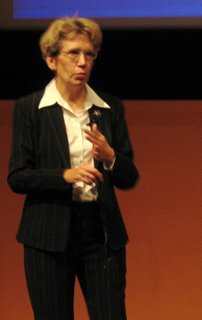 In "Disciplines, Documents, and Data: Convergence and Divergence in the Scholarly Information Infrastructure," Christine Borgman (UCLA) provided an overview of her forthcoming book Scholarship in the Digital Age: Information, Infrastructure, and the Internet (2007). While the other two plenary sessions were good, it was the one with Borgman that I found most relevant to me as a PhD student, librarian and freelance editor.
In "Disciplines, Documents, and Data: Convergence and Divergence in the Scholarly Information Infrastructure," Christine Borgman (UCLA) provided an overview of her forthcoming book Scholarship in the Digital Age: Information, Infrastructure, and the Internet (2007). While the other two plenary sessions were good, it was the one with Borgman that I found most relevant to me as a PhD student, librarian and freelance editor.The fact that she cited websites and not scholarly works as examples is indicative, in my opinion, of the future of scholarly communication. Some of the websites were:
Sloan Digital Sky Survey
Incorporated Research Institutions for Seismology
Electronic Cultural Atlas Initiative
She mentioned the usual technical definition of "data"—"reinterpretable representation of information in a formalized manner suitable for communication, interpretation or processing" (Reference Model for an Open Archival Information System [pdf], 2002)—as an introduction to the socio-technical definition: "alleged evidence" (Buckland, 2006). She then made the point that data needs to be interpreted, analyzed, etc.
Borgman discussed the disciplinary differences between science, social science, and the humanities, and how the data used in the three fields vary greatly. Memorable quote from her friend: "The plural of anecdote is not data." She also talked about incentives to share data (i.e., tradition of "open science"; collaboration; reciprocity; recognition; coercion) and incentives not to share (i.e., rewards are for publication, not data management; effort to document data; competition, priority of claims; intellectual property).
Do scholars share more now? According to Borgman, it depends on the field, but even with arXiv as the poster child for open access and evidence that self-archived articles get cited more, less than 4 percent of publications that should have been archived in PubMed Central are actually available online at this time.
While there is quite a bit of resistance now, I believe that open access journals will eventually be the norm. It may take a decade and some legislation, but it will happen. That should make things easier for publishers and authors in developing countries like the Philippines. But there's another problem: not too many Filipinos are doing research...
Category: i-Conference 2006
Borgman discussed the disciplinary differences between science, social science, and the humanities, and how the data used in the three fields vary greatly. Memorable quote from her friend: "The plural of anecdote is not data." She also talked about incentives to share data (i.e., tradition of "open science"; collaboration; reciprocity; recognition; coercion) and incentives not to share (i.e., rewards are for publication, not data management; effort to document data; competition, priority of claims; intellectual property).
Do scholars share more now? According to Borgman, it depends on the field, but even with arXiv as the poster child for open access and evidence that self-archived articles get cited more, less than 4 percent of publications that should have been archived in PubMed Central are actually available online at this time.
While there is quite a bit of resistance now, I believe that open access journals will eventually be the norm. It may take a decade and some legislation, but it will happen. That should make things easier for publishers and authors in developing countries like the Philippines. But there's another problem: not too many Filipinos are doing research...
Category: i-Conference 2006

